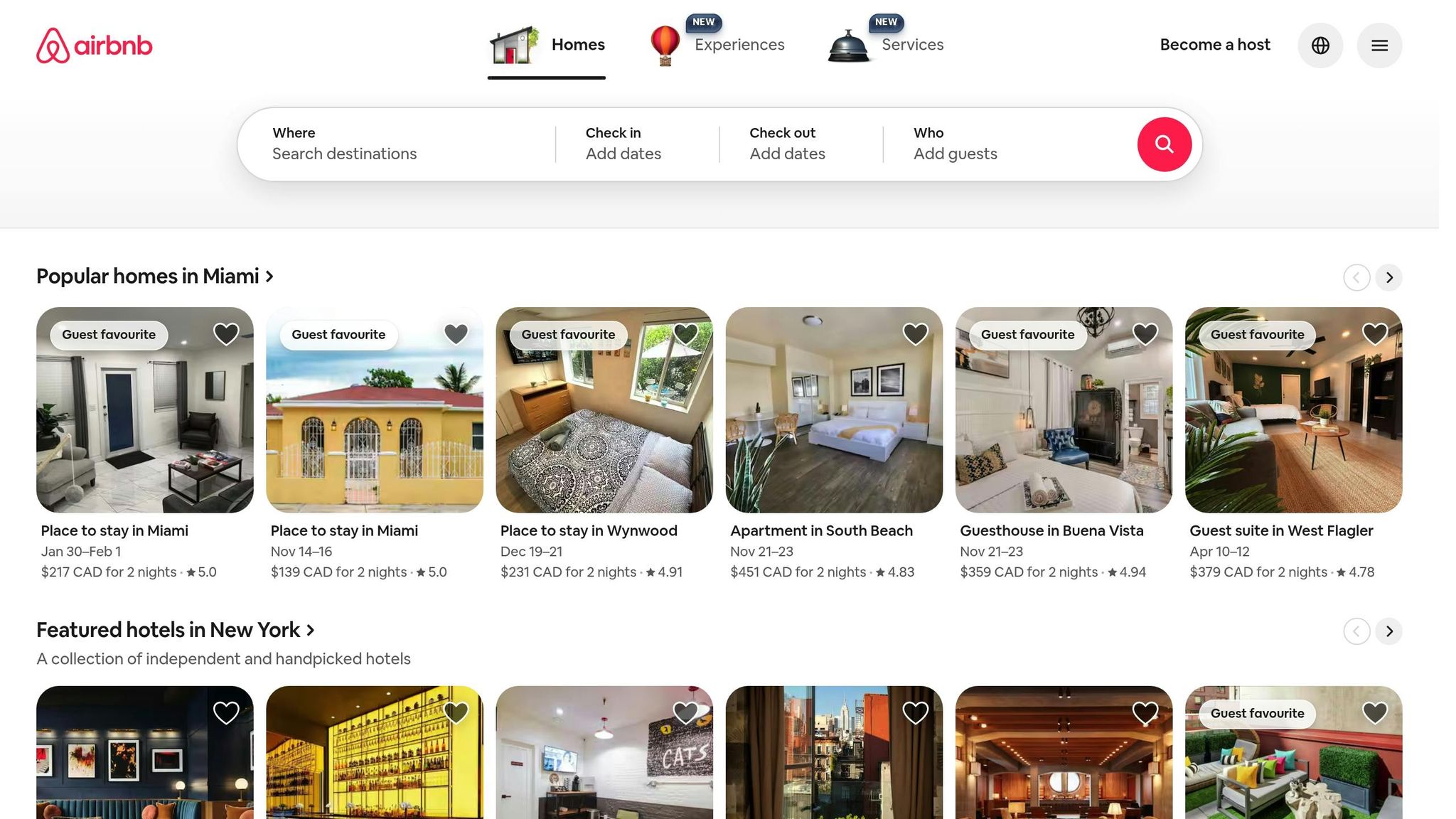Short-term rental owners in Nova Scotia must balance protecting their property and respecting guest privacy. This isn't just a best practice - it's required by law. Failing to disclose security cameras can result in fines, while clear communication builds guest trust and improves satisfaction.
Key takeaways:
- Registration is mandatory: Hosts must register properties under the Short-term Rentals Registration Act, with fines from $1,000 to $100,000 for non-compliance.
- Camera rules: Federal privacy laws and local by-laws govern camera placement. Cameras in private areas (e.g., bedrooms, bathrooms) are strictly prohibited.
- Transparency is essential: Clearly disclose camera locations in listings, booking confirmations, and on-site signage. Obtain guest consent during the booking process.
- Penalties for violations: Non-compliance with privacy laws can result in legal action and financial penalties.
Don’t make this beginner mistake with exterior cameras at your Airbnb

Nova Scotia's Regulatory Framework
Nova Scotia has set clear rules for short-term rental properties, focusing on registration and ensuring compliance with both provincial and municipal laws. These regulations form the basis for understanding the legal and ethical use of surveillance cameras in such properties.
Provincial and Municipal Regulations
The Short-term Rentals Registration Act, along with its accompanying regulations (N.S. Reg. 158/2024)[1][2][3][4], mandates that all short-term rental hosts register their properties with the province. This registration isn't optional - it’s a legal requirement that comes with hefty penalties for non-compliance. Fines for failing to register can range from $1,000 to $100,000[5].
Adding to the complexity, each municipality in Nova Scotia has the authority to enforce its own by-laws. These local rules can vary widely, so hosts must take the time to understand and follow any additional requirements specific to their municipality.
Camera Usage Compliance Requirements
Although the Short-term Rentals Registration Act governs property registration, it doesn’t address rules about surveillance cameras or privacy. For camera usage, hosts must turn to federal privacy laws and any applicable municipal by-laws. This means checking local regulations to ensure any camera installations are compliant with privacy standards.
In short, operating a short-term rental in Nova Scotia requires attention to both provincial registration laws and local by-laws. Staying informed and adhering to these rules is crucial for running a legally compliant rental property in the province.
Legal Guidelines for Camera Placement
In Nova Scotia, there are no specific provincial regulations dictating where cameras should be placed. However, hosts must comply with federal privacy laws and any applicable municipal by-laws. These rules help establish clear boundaries for appropriate and inappropriate camera placement.
Where Cameras Are Allowed and Prohibited
To respect privacy, it’s best to stick to exterior cameras focused on entrances, driveways, or other outdoor areas. These placements help ensure security without intruding on guests' personal space. If cameras are installed in shared indoor spaces, their presence must be disclosed, and guest consent is required. Under no circumstances should cameras be placed in private areas like bedrooms or bathrooms.
Consequences of Non-Compliance
Ignoring these guidelines can lead to serious consequences. Violations of federal privacy laws or municipal by-laws can result in enforcement measures and financial penalties. This makes it essential for hosts to fully understand and comply with all privacy-related requirements.
Guest Disclosure Best Practices
Nova Scotia's legal framework emphasizes the importance of clear disclosure practices to build trust with guests and reduce potential disputes [6]. A key aspect of this is providing detailed information about security measures before guests arrive and reinforcing this transparency throughout their stay.
How to Disclose Camera Usage
Start by clearly stating the presence and location of surveillance cameras in your rental listing. Be upfront so potential guests can make informed decisions before booking. For instance, you could include statements like: "Exterior security cameras monitor the front entrance and driveway" or "A common area camera is located in the main living space." Transparency at this stage helps set expectations early.
Follow up by reiterating these details in your welcome emails or booking confirmation messages. This gives guests another chance to review the information and ask any questions before their arrival.
"Full disclosure is not just a legal obligation; it's also a best practice for maintaining positive guest relationships."
– Safely [6]
Once guests arrive, reinforce this transparency by placing clear signs at entry points and labelling cameras to indicate active monitoring. This not only keeps guests informed but also acts as a deterrent for potential security issues.
Make sure your communication includes accessible contact information, such as a phone number or email address, so guests can easily reach out with any concerns during their stay.
Finally, take the extra step of documenting guest consent to ensure transparency and prevent misunderstandings.
Recording Guest Consent
Incorporate a checkbox or signature requirement into your booking process to document guest acknowledgment of surveillance cameras. Keeping digital records of these acknowledgments can be invaluable if disputes arise later.
While visible disclosures set clear expectations, documented consent strengthens these efforts. However, even with consent, it's essential to respect guest privacy. Avoid placing cameras in areas that might feel intrusive, focusing instead on critical security zones. This balance ensures guests feel secure without compromising their comfort [6].
"Transparency is crucial. Most jurisdictions require property managers to disclose the presence and purpose of surveillance cameras to avoid legal complications."
– Amber Harris, Insurance Claims Leader, Safely [6]
Under no circumstances should hidden cameras be used. Concealed surveillance is a serious violation of privacy and can result in legal penalties and damage to your reputation [6]. Additionally, disable audio recording features whenever possible, as audio capture often requires additional consent and introduces further legal complexities in many jurisdictions [6].
sbb-itb-b5e1074
Building Guest Trust with Clear Security Measures
Earning guest trust is a cornerstone of success in the short-term rental market. As mentioned in disclosure best practices, providing clear and honest information is key to reassuring guests. Open communication helps guests understand that security measures, like surveillance, are there to protect the property, not to invade their privacy. Here’s how to strike the right balance between security and privacy while addressing guest concerns.
Striking the Right Balance Between Security and Privacy
Be upfront about which areas are monitored and emphasize that surveillance is in place to safeguard the property. A straightforward privacy policy that explains why monitoring is necessary and how any data is handled can go a long way in making guests feel at ease. Transparency here shows respect for their privacy while highlighting your commitment to safety.
Addressing Guest Concerns Effectively
Transparency is just the starting point - handling guest concerns requires proactive communication. Anticipate questions and provide clear answers before they even have to ask. If a concern does arise, reassure guests by explaining that monitoring is limited to public or exterior areas, ensuring their personal privacy is fully respected.
Security Measures Comparison
Keeping your property safe while respecting guest privacy is a priority for rental owners in Nova Scotia. To achieve this, any use of video surveillance must align with Canadian privacy laws, including PIPEDA.
Here are some practical steps to ensure compliance and maintain trust with your guests:
- Clearly outline the purpose of surveillance and communicate it to guests.
- Place signs at eye level that explain whether monitoring is live or recorded, specify recording times, state the purpose, and provide contact details[7].
- Obtain explicit consent from guests before initiating any recording.
Conclusion: Key Points for Property Owners
Maintaining a secure and trustworthy rental operation requires more than just good intentions - it hinges on clear security practices, transparent disclosures, and strict adherence to registration rules. For property owners in Nova Scotia, compliance starts with registering with the Nova Scotia Tourist Accommodations Registry and following local by-laws.
Here's what you need to know: Hosts are required to register, with fees ranging from $50 for primary residences to $2,000 for commercial properties in Halifax [12[1]][133]. Your registration number must appear in all online advertisements [101], and any changes must be reported within 10 days [101]. Failing to comply can lead to fines between $1,000 and $100,000 [18[1]], with each day of non-compliance treated as a separate offence [18[3]].
FAQs
What are the rules for using and disclosing cameras in short-term rentals in Nova Scotia?
In Nova Scotia, short-term rental hosts need to adhere to strict rules regarding the use of cameras on their properties. Cameras are strictly prohibited in private areas such as bedrooms and bathrooms. Additionally, hosts are required to inform guests about any cameras on the property before their stay begins. This includes clearly stating where the cameras are located and explaining their purpose, such as for security or property monitoring.
Respecting privacy laws and prioritizing guest comfort are essential. Being upfront about this information not only ensures compliance but also helps establish trust, contributing to a better experience for both hosts and guests.
What steps should short-term rental owners in Nova Scotia take to comply with privacy laws and local regulations when using security cameras?
To adhere to privacy laws and local regulations in Nova Scotia, short-term rental owners need to handle security cameras with care and transparency. Cameras must never be installed in private spaces such as bedrooms or bathrooms, and their existence must be clearly communicated to guests before they make a booking. Additionally, owners should review the Short-term Rentals Registration Act and local municipal land-use by-laws to ensure their property aligns with all legal obligations.
By respecting these rules and safeguarding guest privacy, owners can stay compliant while building trust and confidence with their guests.
How can hosts maintain guest privacy while ensuring property security in short-term rentals?
To balance guest privacy with property security, hosts can adopt the following practices:
- Skip indoor cameras altogether to safeguard guest privacy.
- Opt for outdoor cameras instead, ensuring they don’t point toward windows or private areas.
- Be upfront about any cameras by clearly noting their presence and exact locations in both the property listing and the welcome guide.
- If using tools like decibel monitors, notify guests ahead of time and clarify their purpose.
Transparency and compliance with privacy rules not only enhance security but also help build trust with guests.
Related Blog Posts
- Short-Term Rental Regulations in Nova Scotia: Eastern Shore (Sheet Harbour, Guysborough, Sherbrooke)
- Short-Term Rental Regulations in Nova Scotia: Yarmouth & Acadian Shores (Yarmouth, Clare, Digby)
- Is Airbnb Legal in Nova Scotia? Understanding Short‑Term Rental Rules
- House Rules Template for Nova Scotia STRs: Pets, Noise, Parking and Parties



